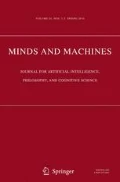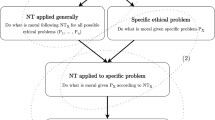Abstract
Discussions about the achievements and limitations of the various approaches to the development of intelligent systems can have an essential impact on empirically based research, and with that also on the future development of computer technologies. However, such discussions are often based on vague concepts and assumptions. In this context, we claim that the proposed `three-world ontology' offers the most appropriate conceptual framework in which the basic problems concerned with cognition and computation can be suitably expressed and discussed, although the solutions of some of these problems seem to lie beyond the horizon of our current understanding. We stress the necessity to differentiate between authentic and functional cognitive abilities; although computation is not a plausible way towards authentic intelligence, we claim that computational systems do offer virtually unlimited possibilities to replicate and surpass human cognitive abilities on the functional level.
Similar content being viewed by others
References
Chalmers, J.D. (1996), The Conscious Mind. In Search of a Fundamental Theory, Oxford University Press.
Churchland, M.P. (1995), The Engine of Reason, the Seat of the Soul, The MIT Press.
Copeland, J. (1993), Artificial Intelligence: A Philosophical Introduction, Blackwell.
Flanagan, 0. (1992), Consciousness Reconsidered, The MIT Press.
Fodor, A.J. and Phylyshyn, W.Z. (1988), Connectionism and cognitive architecture: A critical analysis, Cognition, 28, 3-71.
Nagel, T. (1986), The View from Nowhere, Oxford University Press.
Organ, T. (1988), The Self in Its Worlds: East and West, Susquehanna University Press.
Penrose, R. (1997), The Large, the Small and the Human Mind, Cambridge University Press.
Popper, K. (1992), In Search of a Better World, Routledge.
Radovan, M. (1997), 'Computation and Understanding', in M. Gains, M. Paprzycki, X. Wu, eds., Mind Versus Computer, Omsha: IOS Press.
Radovan, M. (1998), 'Authentic and Functional Intelligence', Informatica 22, 319-327.
Searle, R.J. (1992), The Rediscovery of the Mind, The MIT Press.
Searle, R.J. (1995), The Construction of Social Reality, The Free Press.
Searle, R.J. (1997), The Mystery of Consciousness, The New York Review of Books.
Shimony, A. (1997), 'On Mentality, Quantum Mechanic and the Actualisation of Potentialities', in R. Penrose, ed., The Large, the Small and the Human Mind, Cambridge University Press.
Rights and permissions
About this article
Cite this article
Radovan, M. Computation and the Three Worlds. Minds and Machines 10, 255–265 (2000). https://doi.org/10.1023/A:1008385309438
Issue Date:
DOI: https://doi.org/10.1023/A:1008385309438




